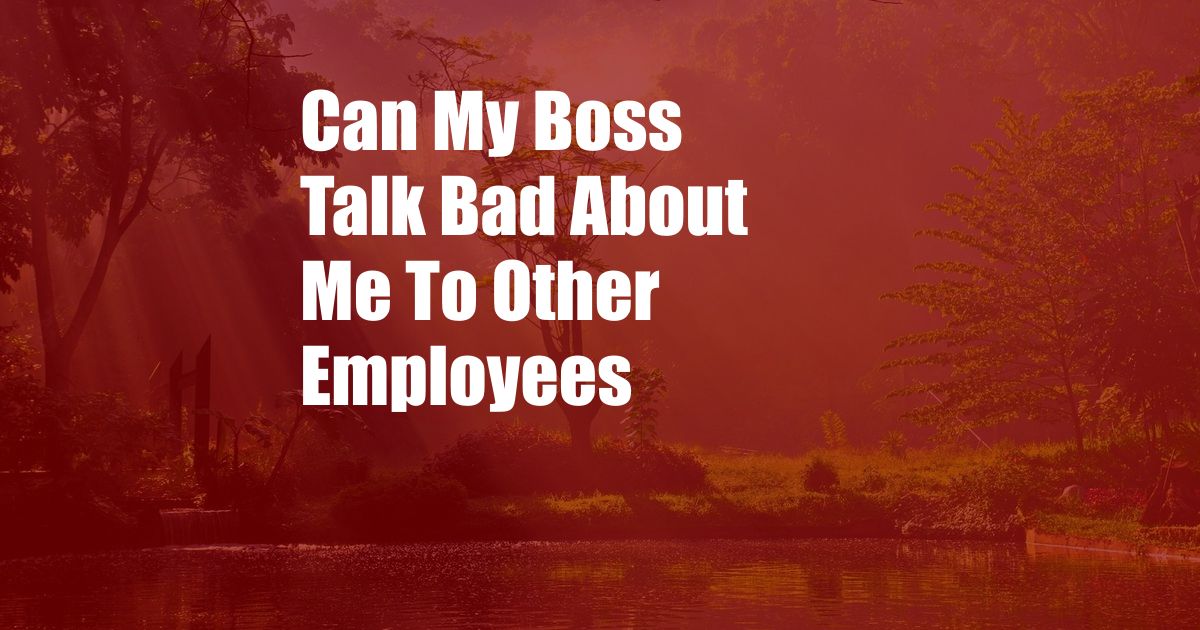
Can My Boss Talk Bad About Me to Other Employees?
A pivotal moment in my early career occurred when I overheard my boss making disparaging remarks about me to a colleague. The feeling of betrayal and violation was profound, leaving me questioning the integrity of my workplace and my own self-worth. This experience raised a fundamental question: to what extent can an employer discuss an employee’s performance or behavior with others?
Employee Confidentiality and Workplace Culture
The concept of employee confidentiality plays a crucial role in maintaining a respectful and professional work environment. When supervisors engage in derogatory conversations about their subordinates, they erode trust and create an atmosphere of fear and insecurity. As a result, employees may become hesitant to voice their concerns or offer constructive feedback, hindering the company’s ability to improve.
Moreover, when negative comments are spread through the organization, it can damage an employee’s reputation and professional standing. This can have far-reaching consequences, affecting their career prospects and overall well-being.
Legal Considerations
In most jurisdictions, there are no specific laws that prohibit employers from talking bad about their employees to others. However, certain exceptions may apply in cases of defamation or discrimination.
- Defamation: Defamation occurs when false and damaging statements are made about an individual. If an employer makes false or exaggerated negative comments about an employee, they may be liable for defamation.
- Discrimination: If an employer’s negative comments are based on a protected characteristic, such as race, religion, or gender, it may constitute discrimination. This type of behavior is illegal and can result in disciplinary action or even lawsuits.
Ethical and Professional Boundaries
Even if an employer’s comments do not fall within the legal definition of defamation or discrimination, they may still violate ethical and professional boundaries.
- Maintaining Confidentiality: Employers have a responsibility to protect the privacy of their employees. This includes keeping confidential information, such as performance reviews and disciplinary actions, private.
- Promoting a Positive Work Environment: Supervisors should foster a work environment that is respectful and supportive. Engaging in negative gossip or spreading rumors damages team morale and undermines productivity.
- Providing Constructive Feedback: If an employer has concerns about an employee’s performance, they should provide direct and constructive feedback. This allows the employee to address the issue and improve their performance.
Tips for Dealing with Negative Comments
If you find yourself in a situation where your boss is talking bad about you to others, there are steps you can take:
- Stay Calm and Professional: It’s natural to feel hurt or angry, but it’s important to maintain a professional demeanor. Reacting emotionally may only make the situation worse.
- Document the Incident: Make a note of the date, time, and specific comments you heard. This will provide evidence if you need to address the issue with your supervisor or HR.
- Meet with Your Boss Privately: Request a private meeting with your boss to discuss the matter. Clearly explain that you are aware of the negative comments and express your concerns.
- Seek Support from HR or an Employee Advocate: If you are unable to resolve the issue with your boss directly, consider seeking support from HR or an employee advocate. They can provide guidance and ensure that the matter is handled fairly.
Frequently Asked Questions
Q: Can my boss fire me for something they said about me to others?
A: Generally, no. An employer cannot terminate an employee solely based on negative comments they made about them to others. However, if the comments constitute defamation or discrimination, they may provide grounds for legal action.
Q: How can I prevent my boss from talking bad about me to others?
A: While you cannot completely control your boss’s behavior, there are steps you can take to minimize the likelihood of negative comments:
- Maintain a professional and respectful demeanor at all times.
- Meet expectations and perform your job to the best of your ability.
- Address any concerns or issues directly with your boss.
Q: What should I do if I hear my boss talking bad about another employee?
A: If you witness your boss engaging in negative gossip or spreading rumors about another colleague, you can:
- Politely intervene and remind them that it is not appropriate.
- Offer to mediate a conversation between your boss and the employee they are criticizing.
- Report the incident to HR or an employee advocate.
Conclusion
While employers may not have a legal obligation to maintain employee confidentiality, it is an essential ethical and professional responsibility. Negative comments can damage an employee’s reputation, undermine team morale, and create a hostile work environment. If you find yourself in a situation where your boss is talking bad about you to others, it’s important to stay calm, document the incident, and address the matter directly. By advocating for yourself and promoting a positive workplace culture, you can help create a more respectful and productive environment for everyone.
Are you interested in learning more about workplace ethics and employee rights?